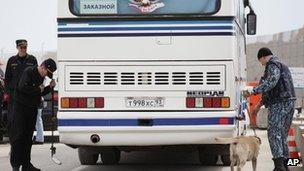Russia bans public protests at 2014 Sochi Winter Olympics
- Published

Mr Putin's decree sets up a "forbidden" zone in Sochi
Russia has banned demonstrations and rallies in Sochi around the Winter Olympics in 2014, in a move immediately denounced by rights activists.
The decree - signed by President Vladimir Putin - also severely restricts access to the Black Sea resort from 7 January to 21 March.
The Kremlin said the measure was needed to guarantee security during the Olympics and Paralympics.
But activists described the decree as "unconstitutional".
'Forbidden zone'
The presidential decree was published in the official Rossiyskaya Gazeta newspaper on Friday.
It imposes a vast "forbidden zone", banning all vehicles from Sochi - with the exception of locally-owned or specially accredited cars, and those used by emergency services.
The document also sets up a number of "controlled zones" at the Olympic venues where all people and their belongings will be searched.
And the decree states that all "gatherings, rallies, demonstrations, marches and pickets that are not related to the Olympics and Paralympics" will be banned from 7 January to 21 March.
Human rights activists condemned the measures, saying they amounted to "a state of emergency" in Sochi and the surrounding area.
"Putin is effectively turning Sochi into a special operation zone, banning rallies and eliminating freedom of movement," Tatiana Lokshina, a Russia-based member of Human Rights Watch, was quoted as saying by the AFP news agency.
IOC President Thomas Bach: 'Our responsibility is the respect for the Olympic values"
Russian assurances
Gay activist Nikolai Alexeyev wrote in a tweet, external that the decree was "unconstitutional", vowing to contest it in court.
"There still will be a gay pride parade," he added.
The Kremlin has repeatedly rejected gay rights activists' requests to stage a pride event during the Olympics.
On Thursday, International Olympic Committee chief Jacques Rogge said Moscow had given assurances its law to counter gay "propaganda" would not affect the Sochi games.
The law - signed in June - prescribes heavy fines for anyone providing information about homosexuality to people under 18.
Gay rights campaigners have called for the 2014 Games to be moved from Sochi, amid fears the bill could be used against athletes and spectators.
The Winter Olympics are taking place on 7-23 February and are followed by the Paralympics on 7-16 March.
- Published10 August 2013